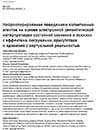Neurooperating the behavior of cognitive agents based on electronic semantic interpretation of states of consciousness and psyche with the effects of immersion, presence and unity with virtual reality
DOI: 10.33917/mic-1.90.2020.5-12
The article is devoted to the possibility of neurooperating behavior of heterogeneous groups of cognitive agents, which in the conditions of immersion of consciousness in virtual reality is based on the formation of a complex image of quasi-reality in the human mind using the information technology platform of non-invasive neurointerfaces. The necessity of using neural networks and fuzzy logic for identification and analysis of nonlinear neuro-fuzzy approximations of the psychosemantic state of the control object’s personality on the basis of electronic semantization (semantic interpretation) of the States of its consciousness and psyche is justified. It is proposed to develop software tools for quenching or activating, depending on the need, neurophysiological or psychoemotional stress as a source of aggressive behavior in real life, through neuro-linguistic elements and neuro-marketing mechanics with the effects of immersion, presence and unity of the individual with the digital virtual environment.
References:
|
1. Ageev A. I., Loginov E. L. Neuro-management of personality. – Moscow: Institute of economic strategies, 2019. – 320 p. 2. Velichkovsky B. B., Gusev A. N., Vinogradova V. F., Arbekova O. A. Cognitive control and sense of presence in virtual environments //Experimental psychology. 2016. Vol. 9. № 1. pp. 5-20. 3. Gorkin A. G., Rozhdestvin A.V., Chistova Yu. R. Reconstruction of the components of subjective experience based on the activity of specialized neurons //Neurocomputers: development, application. 2015. № 4. pp. 29-30. 4. Dersen V. Tools of neuromarketing: problems and prospects //Science and innovations. 2018. № 6 (184). pp. 18-22. 5. Efremova N. ya. Manipulation of human consciousness in the framework of virtual reality //Territory of new opportunities. Bulletin of the VLA-divostok state University of Economics and service. 2012. № 4 (17). pp. 61-68. 6. Izotova E. I. Social and cognitive determinants of emotion coding in real and virtual space //Psychological research: electronic scientific journal. 2015. Vol. 8. № 42. p. 7. 7. Kipyatkov N. Yu., Golovina A. E., Dutov V. B., Lytaev S. A. Organizational and regulatory dynamics of bioelectric activity of the brain //Vestnik klinicheskoy neyrofiziologii. 2016. № 2. pp. 45-53. 8. Kovsh E. M., Ermakov P. N., Vorobyova E. V. Reflection of the level of aggressiveness and hostility in the induced brain activity of men when evaluating emotionally colored stimuli //Bulletin of the Leningrad state economic University. Of A. S. Pushkin. 2016. № 4-1. pp. 55-66. 9. Lebedev A. N. Logico-stochastic problems in neuromarketing //Institute of psychology of the Russian Academy of Sciences. Social and economic psychology. 2016. Vol. 1. № 4 (4). pp. 94-114. 10. Loginov E. L., Raikov A. N., shkuta A. A. The use of neuro-technologies in programming cognitive-behavioral stereotypes of individuals’ actions for the sustainable functioning of social management systems //Neurocomputers: development, application. 2018. № 9. pp. 34-45. 11. Loginov E. L. Combination of using agent-oriented, discrete-event modeling and system dynamics modeling to optimize the cooperative behavior of collections of Autonomous agents in fuzzy environments //Economics and law. 2015. № 2. pp. 15-19. 12. Lutsenko E. V. Principles and perspectives correct landlord Noi interpretations are subjective (virtual) models of the physical and social reality generated by the consciousness of the person //Polythematicsky network electronic scientific journal of the Kuban state agrarian University. 2016. № 115. pp. 22-75. 13. Nedelko A. Yu. Possibilities and limitations of using neuromarketing methods //Management Sciences. 2018. Vol. 8. № 4. pp. 77-83. 14. Sergin V. Ya. Auto-identification of neural activity patterns as a physiological mechanism of awareness //Journal of higher nervous activity. I. P. Pavlova. 2016. Vol. 66. № 3. p. 259. 15. Tikhomirova E. V. Features of cognitive assessment of inclusion in the virtual community by subjects of Internet communication // Izvestiya Saratovsky University. New series. A series of educational Acmeology. Developmental and educational psychology. 2015. Vol. 4. № 1. pp. 66-69. 16. Ulyanov S. V., Mamaeva A. A., Shevchenko A.V. cognitive intelligent control Technology: knowledge base optimizer on soft computing and deep machine learning //Fuzzy systems and soft computing. 2018. Vol. 13. № 2. pp. 166-182. |



